

Muscat: Oman moved a step closer to launching a full-fledged manufacturing unit of advanced semiconductor chips. On Monday, the first batch of advanced electronic chips design (Oman-1, Oman-2), made by the Global Semiconductor Microelectronics Company (GSME Oman) was dispatched to the laboratories of the Taiwan Semiconductor Manufacturing Company.
The chips, made by Omani designers, have been sent to Taiwan for testing and verification as GSME Oman prepares itself to start a streamlined production and manufacturing.
The tie-up between Oman and Taiwan is part of the National Programme for Digital Economy and the project was undertaken with the support of the Ministry of Transport, Communications and Information Technology and the Ministry of Labour.
The production of advanced electronic chips is a step forward towards the implementation of an agreement that was inked in June 2022 by Global Semiconductor Microelectronics Company with the Ministry of Transport, Communications and Information Technology and the Ministry of Labour.
The agreement was aimed at establishing the first investment project in the Sultanate of Oman to design and manufacture semiconductors and advanced electronic chips, besides training Omani cadres in this field.
On Monday, the consignment was dispatched at a ceremony that was held under the auspices of Said Hamoud Al Ma’awali, Minister of Transport, Communications and Information Technology and attended by Qais Mohammed Al Yousef, Minister of Commerce, Industry and Investment Promotion. Also present were senior government officials and private sector representatives.
Speaking at the ceremony, Dr. Ali Amer Al Shidhani, Undersecretary of the Ministry of Transport, Communications and Information Technology for Communications and Information Technology, said: “The step assumes significance in Oman’s drive to make semiconductors and electronic chips and it demonstrates the capabilities and talents of young Omani engineers.”
He added that the move paves the way for domestic and global investments in research, development and advanced chips manufacturing.
Al Shidhani said the project will promote the growth of industries related to semiconductors and electronic chips in general, and build an integrated ecosystem that supports related industry in Oman.
Farhat Jahangir, CEO of GSME Oman, said: “The registration of the first locally designed set of chips (Oman-1 and Oman-2) reflects a commitment from the company to promote technological growth and innovation in Oman by investing in the development of domestic talent and expertise. The overall objective is to lay strong grounds for the establishment of a trading centre for chip design and validation in Oman.”
Earlier, Oman Semiconductor and Electronics Company conducted a comprehensive chip design training programme that was attended by more than 90 engineers. The programme was aimed at furnishing a stimulating environment for international and local companies to make Oman a regional home for their operations and services.
Semiconductors have certain electrical properties that enable them to serve as a cornerstone for making computers and other electronic devices. Semiconductors are also a means of controlling electrical current, car computers and aircrafts, among other equipment. The total global sales revenues of semiconductors and electronic chips in 2022 stood at US $601.7 billion approx worldwide, up by 1.1 percent, compared to 2021 revenues (US$595 billion).